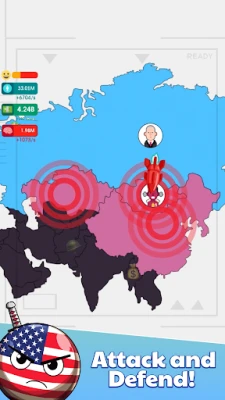
Latest Version
8.51
December 26, 2024
Supersonic Studios LTD
Games
Android
0
Free
com.ridgge.conquercountries
Report a Problem
More About Conquer Countries
You Are the President: Balancing Diplomacy and Domestic Prosperity
In the intricate world of governance, the role of a president is multifaceted. As the leader of a nation, you face critical decisions that can shape the future of your country. Will you foster strong relationships with neighboring nations, or will you choose a path of confrontation? Will your focus be on the happiness of your citizens, or will you prioritize economic strength? In this article, we will explore the delicate balance between diplomacy and domestic prosperity, providing insights into how these choices impact your presidency.
The Importance of Diplomatic Relations
Establishing and maintaining good relations with neighboring countries is crucial for any president. Diplomatic ties can lead to numerous benefits, including trade agreements, security partnerships, and cultural exchanges. A strong diplomatic stance can enhance your nation's global standing and create a more stable environment for your citizens.
Building Alliances
Alliances can serve as a powerful tool in international relations. By collaborating with other nations, you can address common challenges such as climate change, terrorism, and economic instability. Forming strategic partnerships not only strengthens your position on the world stage but also fosters a sense of unity among nations.
Conflict Resolution
In contrast, failing to maintain good relations can lead to conflicts that may escalate into larger issues. As president, you must be adept at conflict resolution, employing diplomacy to address disputes before they spiral out of control. Engaging in dialogue and negotiation can prevent misunderstandings and promote peace.
Focusing on Domestic Happiness
While international relations are vital, the happiness of your citizens should remain a top priority. A satisfied populace is essential for a stable and prosperous nation. As president, you have the power to implement policies that enhance the quality of life for your people.
Investing in Education
Education is a cornerstone of societal happiness. By investing in quality education, you empower your citizens with the knowledge and skills necessary to thrive. A well-educated population is more likely to contribute positively to the economy and engage in civic activities, fostering a sense of community and belonging.
Healthcare Accessibility
Access to healthcare is another critical factor in ensuring the well-being of your citizens. Implementing policies that provide affordable healthcare options can significantly improve public health and overall happiness. When citizens feel secure in their health, they are more likely to be productive and engaged members of society.
Strengthening the Economy
A robust economy is essential for any nation. As president, you must focus on creating an environment conducive to economic growth. This involves implementing policies that encourage innovation, support small businesses, and attract foreign investment.
Encouraging Entrepreneurship
Entrepreneurship drives economic growth and job creation. By providing resources and support for startups, you can foster a culture of innovation. This not only boosts the economy but also empowers individuals to pursue their passions and contribute to society.
Investing in Infrastructure
Infrastructure development is another critical aspect of economic strength. Investing in transportation, communication, and energy systems can enhance productivity and attract businesses. A well-developed infrastructure supports trade and improves the quality of life for citizens, creating a win-win situation.
Finding the Right Balance
As president, the challenge lies in finding the right balance between maintaining good relations with neighbors and ensuring the happiness and prosperity of your citizens. Each decision you make has far-reaching consequences, and it is essential to consider both domestic and international implications.
Integrating Domestic and Foreign Policies
To achieve this balance, consider integrating your domestic and foreign policies. For instance, promoting trade agreements that benefit your economy can also strengthen diplomatic ties. By aligning your goals, you can create a cohesive strategy that addresses both international relations and domestic needs.
Engaging with Citizens
Engaging with your citizens is vital for understanding their needs and concerns. Regular communication through town halls, social media, and public forums can help you gauge public sentiment and adjust your policies accordingly. When citizens feel heard, they are more likely to support your initiatives, leading to a happier and more united nation.
Conclusion: The Path Forward
In conclusion, being the president is a complex and demanding role that requires a delicate balance between diplomacy and domestic prosperity. By fostering good relations with neighboring countries while prioritizing the happiness and economic strength of your citizens, you can create a thriving nation. The choices you make today will shape the future of your country, so approach each decision with care and foresight. Your leadership can pave the way for a prosperous and harmonious society.
Rate the App
User Reviews
Popular Apps










Editor's Choice






























